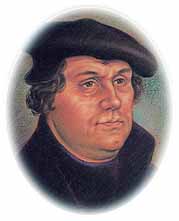
Martin Luther
A Course Wedge
Standing alone, a scholarly monk nailed a notice to the
door of Castle Church in Wittenberg, Germany, on October 31, 1517.
Little did he know his pounding hammer would set off
controversy that would galvanize the growing Protestant movement. Martin Luther, the once
timid village boy, never dreamed he would one day be called the "Father of the
Reformation."
In his Ninety-Five Theses, posted for all to read, he
explained how certain practices of the Catholic church in his day did not adhere to the
Word of God. With incisive argument, he addressed corruptions and distortions of worship
that kept common people from a true understanding of salvation by faith in Christ
alone.
Pope Leo X called him a "wild boar." His own best
friend Philip Melanchthon said he was a "violent physician." Luther admitted the
same himself: "God uses coarse wedges for splitting coarse blocks."
Born in 1484 to a middle class family, Luther had access to
both economic and educational advantages. Although his parents loved him dearly and
nurtured him well, Luther later explained that their sometimes excessive discipline
encouraged his natural cowardice.
It was in a fit of terror in a thunderstorm that he cried
out an oath that if God would save him, he would become a monk. Much to his father's
disappointment, in 1505 Luther joined the stringent Augustinian order, which emphasized
absolute obedience and self-abasement.
Even within the safety of the monastery walls, however,
Luther carried with him his greatest agony-his hear of God. To Luther, God was
unapproachably holy. He was obsessed with God's righteousness and felt crushed by what he
saw as God's unattainable demands of perfection. Many nights, in private penance, Luther
would beat himself until he bled and fell unconscious.
His sole consolation was studying the Bible; it was then he
felt closest to God. One day, he meditated on the truth of Romans 1:17: "For in it
[the gospel] the righteousness of God is revealed from faith to faith; as it is written,
"But the righteous man shall live by faith.""
This was the answer. Luther wept as he accepted Christ's
finished work on the cross as full payment for his sin. He was free at last, and new joy
filled his heart. When he began preaching and teaching at the University of Wittenberg,
people flocked to hear his vibrant messages.
Church officials grew angrier by the day. Luther's words, at
times caustic and rough, were drawing money and power away from the established church and
stirring up both religious and political fervor. The Ninety-Five Theses was a blow that
could not be overlooked.
In 1521, Luther was ordered to appear before the Diet
(Assembly) of Worms and recant. After hours of prayer, Luther gave them this bold yet
humble reply: "My conscience is captive to the Word of God. Here I stand. God help
me. Amen."
Immediately he was declared an outlaw, and his guarantee of
safe conduct was revoked. Rumors flew that the church's supporters would capture him and
burn him at the stake. God had other plans for him, though, and Luther was unafraid.
On his journey home, a band of masked men, really Luther's
friends in disguise, "kidnapped" him and rode him to safety on horseback to the
castle of Wartburg. In this new refuge, Luther was able to continue writing reform
treatises and to complete his translation of the Bible into German, a landmark literary
feat.
After the Pope died, Luther returned to more routine life in
Wittenberg. He married a former nun, Katherine von Bora, in 1525, and had six children,
four of whom survived. Until his death in 1546 at age 63, Luther's prodigious energy did
not flag.
Though battling countless illnesses, ongoing ailments, and
bouts of depression, he provided continual guidance for blossoming Reformation activities.
He was uncompromising to the last. Biographer Mike Fearon explains Luther's mission:
"Though speaking out plainly against sin, he loved sinners and offered them God's
righteousness as the only solution."
Luther At Home
At first, Luther insisted he would never marry. But when he
helped twelve nuns escape from a convent, he came face to face with Katherine von Bora,
the woman who helped a confirmed, forty-one-year-old bachelor change his ways.
Although they were not "in love" when they wed,
their marriage became a model of romance and deepest affection that has endeared
generations.
He spoke of his home life with characteristic sparkling
wit.
- "In domestic affairs I defer to Katie. Otherwise, I am led by the Holy
Ghost."
- "Let them [other men] laugh. God and the angels are smiling in heaven."
- "I am an inferior lord, she the superior; I am Aaron, she is my Moses."
Katherine returned his glowing admiration. When Martin
died, in bereavement she said: "If I had a principality or an empire and lost it, it
would not have been as painful as it is now that the dear Lord God has taken from me this
precious and beloved man, and not from me alone, but from the whole world." |
